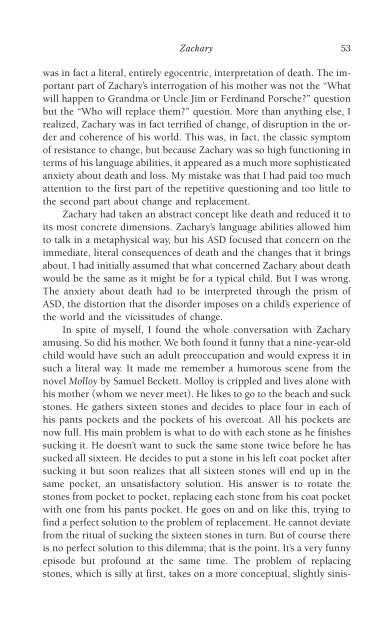978-1572305441
autism
autism
Create successful ePaper yourself
Turn your PDF publications into a flip-book with our unique Google optimized e-Paper software.
Zachary 53<br />
was in fact a literal, entirely egocentric, interpretation of death. The important<br />
part of Zachary’s interrogation of his mother was not the “What<br />
will happen to Grandma or Uncle Jim or Ferdinand Porsche?” question<br />
but the “Who will replace them?” question. More than anything else, I<br />
realized, Zachary was in fact terrified of change, of disruption in the order<br />
and coherence of his world. This was, in fact, the classic symptom<br />
of resistance to change, but because Zachary was so high functioning in<br />
terms of his language abilities, it appeared as a much more sophisticated<br />
anxiety about death and loss. My mistake was that I had paid too much<br />
attention to the first part of the repetitive questioning and too little to<br />
the second part about change and replacement.<br />
Zachary had taken an abstract concept like death and reduced it to<br />
its most concrete dimensions. Zachary’s language abilities allowed him<br />
to talk in a metaphysical way, but his ASD focused that concern on the<br />
immediate, literal consequences of death and the changes that it brings<br />
about. I had initially assumed that what concerned Zachary about death<br />
would be the same as it might be for a typical child. But I was wrong.<br />
The anxiety about death had to be interpreted through the prism of<br />
ASD, the distortion that the disorder imposes on a child’s experience of<br />
the world and the vicissitudes of change.<br />
In spite of myself, I found the whole conversation with Zachary<br />
amusing. So did his mother. We both found it funny that a nine-year-old<br />
child would have such an adult preoccupation and would express it in<br />
such a literal way. It made me remember a humorous scene from the<br />
novel Molloy by Samuel Beckett. Molloy is crippled and lives alone with<br />
his mother (whom we never meet). He likes to go to the beach and suck<br />
stones. He gathers sixteen stones and decides to place four in each of<br />
his pants pockets and the pockets of his overcoat. All his pockets are<br />
now full. His main problem is what to do with each stone as he finishes<br />
sucking it. He doesn’t want to suck the same stone twice before he has<br />
sucked all sixteen. He decides to put a stone in his left coat pocket after<br />
sucking it but soon realizes that all sixteen stones will end up in the<br />
same pocket, an unsatisfactory solution. His answer is to rotate the<br />
stones from pocket to pocket, replacing each stone from his coat pocket<br />
with one from his pants pocket. He goes on and on like this, trying to<br />
find a perfect solution to the problem of replacement. He cannot deviate<br />
from the ritual of sucking the sixteen stones in turn. But of course there<br />
is no perfect solution to this dilemma; that is the point. It’s a very funny<br />
episode but profound at the same time. The problem of replacing<br />
stones, which is silly at first, takes on a more conceptual, slightly sinis-



